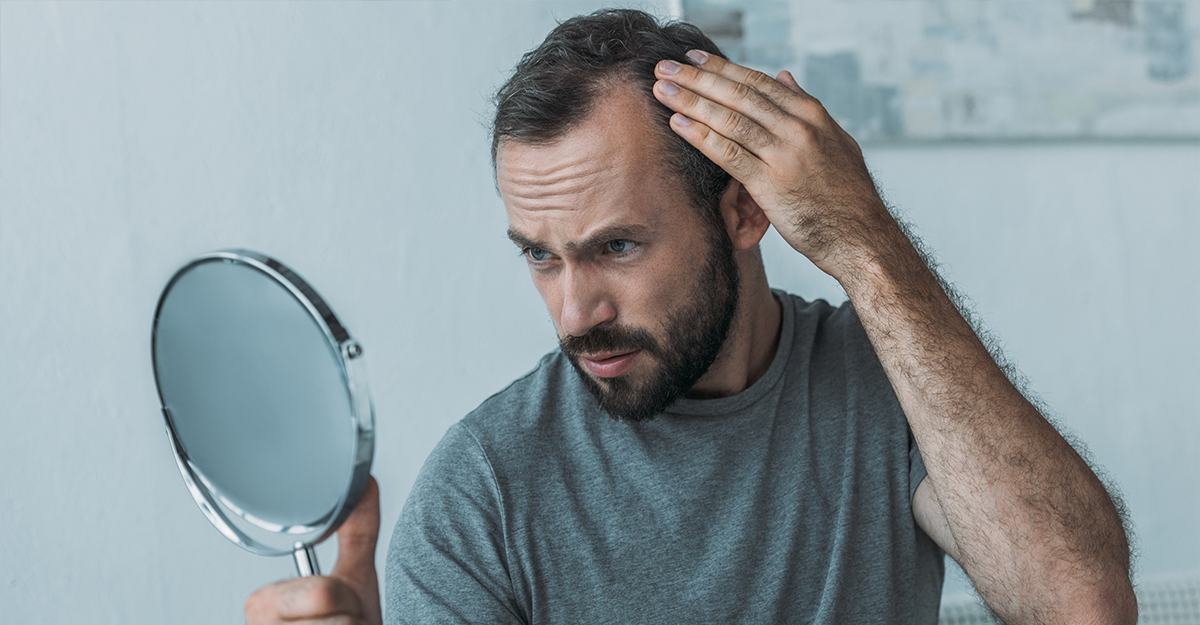
Does B12 Help Hair Growth or Cause Hair Loss?
If you’ve noticed hair thinning, baldness, graying hair, or other changes in hair health, it’s time to explore nutrient deficiencies as a root cause, specifically vitamin B12 (cobalamin) deficiency. Your dermatologist may prescribe topical treatments, but diet changes and dietary supplements can also support new hair growth.
“If you’ve noticed hair thinning, baldness, graying hair, or other changes in hair health, it’s time to explore nutrient deficiencies as a root cause, specifically vitamin B12 (cobalamin) deficiency.”
Vitamin B12 plays an important role in hair growth, and today’s article will explore this relationship. Keep reading to learn more about the causes of hair loss, how levels of vitamin B12 may contribute, and what you can do for hair regrowth.
Root Causes of Hair Loss
Hair loss (alopecia) most often affects the head but can also affect body hair. It can be temporary or permanent. Some common causes of hair loss include:
- Heredity (for example, male pattern baldness is genetic)
- Aging
- Hormonal changes
- Excessive hair care treatments or styling
- Autoimmune hair loss
- Stress
- Specific medical treatments and medication (like chemotherapy or radiation
- Micronutrient deficiencies
Nutrition is critical for healthy hair. Deficiencies in vitamins, minerals, and fatty acids can affect hair loss. Examples include:
- Iron deficiency
- Zinc deficiency
- Vitamin A deficiency or toxicity
- Vitamin D deficiency
- Vitamin E deficiency
- Biotin deficiency
- Riboflavin (vitamin B2) deficiency
- Vitamin C deficiency
- Folate deficiency
- •Vitamin B12 deficiency (Source 1, 2)
Vitamin B12 and Hair Growth
While many nutrients play a role in hair physiology, this article focuses on a significant one: vitamin B12. Vitamin B12 is an essential vitamin and a cofactor for the methionine synthase enzyme, which is a critical step in the production of DNA, RNA, proteins, and dozens of other molecules. It is essential for red blood cells. Because of this role, vitamin B12 is critical for producing and maintaining hair follicles and healthy hair growth.
Additionally, those with hair loss may have a higher prevalence of MTHFR gene mutations, which affect the body’s ability to utilize vitamin B12. (Source 1)
Vitamin B12 Deficiency
Vitamin B12 deficiency is prevalent globally. Lack of vitamin B12 in the diet is a primary cause. Dietary sources of vitamin B12 are animal products, putting vegetarians and vegans at higher risk. Low vitamin b12 levels can also result from poor absorption or greater needs. (Source 3)
Lack of vitamin B12 impacts red blood cell formation and can lead to anemia. Lack of oxygen to the hair follicles affects new hair growth.
How to Increase Vitamin B12 with Diet and Supplements
First, work with your healthcare provider to determine the root cause of hair loss. You may need a blood test for vitamin B12, B vitamins, and other nutrients.
Then, make sure you are getting enough vitamin B12 in your diet to meet the RDA, or recommended daily intake. The RDA is 2.4 mcg for adults. Good dietary sources include meat, eggs, dairy products, fortified cereals, and nutritional yeast. (Source 3)
To correct a deficiency and maintain good vitamin B12 levels, vitamin B12 supplements may be necessary. Because B12 is a water-soluble vitamin, it’s a safe supplement with few side effects. However, not all supplements are created equal.
Core Med Science Liposomal B12 Folate TMG Liquid Spray is physician-designed for optimal absorption and utilization by the body. It contains methylcobalamin, the active form of vitamin B12, folate, and trimethylglycine (TMG) for methylation support.
It’s an excellent formula for those who need extra vitamin B12, such as older adults, those with digestive issues, vegetarians, people with MTHFR mutations, and those suffering from hair loss.
When considering a treatment strategy to regrow hair, don’t overlook the importance of micronutrients, including vitamin B12. Vitamin B12 deficiency can cause hair loss, and supplementation can support new hair growth.
“When considering a treatment strategy to regrow hair, don’t overlook the importance of micronutrients, including vitamin B12. Vitamin B12 deficiency can cause hair loss, and supplementation can support new hair growth.”
References
1. Almohanna, H. M., Ahmed, A. A., Tsatalis, J. P., & Tosti, A. (2019). The Role of Vitamins and Minerals in Hair Loss: A Review. Dermatology and therapy, 9(1), 51–70. Full text: https://www.ncbi.nlm.nih.gov/pmc/articles/PMC6380979/
2. Thompson, J. M., Mirza, M. A., Park, M. K., Qureshi, A. A., & Cho, E. (2017). The Role of Micronutrients in Alopecia Areata: A Review. American journal of clinical dermatology, 18(5), 663–679. Full text: https://www.ncbi.nlm.nih.gov/pmc/articles/PMC5685931/
3. National Institutes of Health Office of Dietary Supplements. Vitamin B12: Fact Sheet for Health Professionals. Accessed 1/18/24 at https://ods.od.nih.gov/factsheets/VitaminB12-HealthProfessional/
